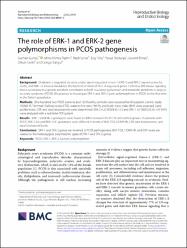The role of ERK-1 and ERK-2 gene polymorphisms in PCOS pathogenesis

Göster/
Erişim
info:eu-repo/semantics/openAccessAttribution 3.0 United Stateshttp://creativecommons.org/licenses/by/3.0/us/Tarih
2022Yazar
Güney, GürhanTaşkın, Mine İslimye
Şener, Nazlı
Tolu, Ezgi
Dodurga, Yavuz
Elmas, Levent
Çetin, Orkun
Sarıgül, Cengiz
Üst veri
Tüm öğe kaydını gösterÖzet
Background: Ovulation is regulated by extracellular signal-regulated kinase-1 (ERK-1) and ERK-2 signaling mechanisms, and ERK-1/2 kinases modulates the function of most of the LH-regulated genes. Defective ERK kinase signaling
that is secondary to a genetic problem contributes to both ovulatory dysfunction and metabolic problems in polycystic ovary syndrome (PCOS). We planned to investigate ERK-1 and ERK-2 gene polymorphisms in PCOS for the frst time
in the Turkish population.
Methods: One hundred two PCOS patients and 102 healthy controls were recruited for this patient control study.
HOMA-IR, Ferriman-Gallwey score (FGS), waist-to-hip ratio (WHR), and body mass index (BMI) were assessed. Lipid
profle levels, CRP, and total testosterone were determined. ERK-2 rs2276008 (G>C) and ERK-1 rs11865228 (G>A) SNPs
were analyzed with a real-time PCR system.
Results: ERK-1 and ERK-2 genotypes were found to difer between the PCOS and control groups. In patients with
PCOS, ERK-1 GA and ERK-2 GC genotypes were diferent in terms of BMI, FGS, HOMA-IR, CRP, total testosterone, and
total cholesterol levels.
Conclusions: ERK-1 and ERK-2 genes are involved in PCOS pathogenesis. BMI, FGS, HOMA-IR, and CRP levels are
related to the heterozygote polymorphic types of ERK-1 and ERK-2 genes.
Kaynak
Reproductive Biology and EndocrinologyCilt
20Sayı
1Koleksiyonlar
Aşağıdaki lisans dosyası bu öğe ile ilişkilidir:


















